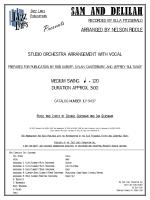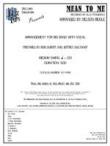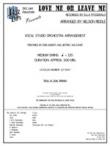SAM AND DELILAH [DOWNLOAD]
Recorded by Ella Fitzgerald
Arranged by Nelson Riddle, Prepared for Publication by Rob DuBoff, Dylan Canterbury, and Jeffrey Sultanof

Cat #: JLP-9437DL
$65.00This product is available for immediate download after purchase.
Questions?
Please call +1-518-587-1102 or email us.
Edition: Jazz Studio Orchestra Arrangement with Vocal
Description: Swing - Medium Difficult
Publisher: Jazz Lines Publications
This is one of a series of arrangements written by Nelson Riddle for Ella Fitzgerald focusing on the Gershwin songbook. These arrangements constitute some of the most famous settings of classic songs for one of the greatest vocalists in American music.Ella Fitzgerald Sings the George and Ira Gershwin Songbook was the high point in the series of songbook packages produced by Norman Granz for the Verve label. There had been four such projects beforehand: boxes of songs by Cole Porter, Rodgers and Hart, Duke Ellington and Irving Berlin preceded it. Granz decided to make the Gershwin box the most ambitious of all of them; 5 LPs plus a 7” limited edition bonus disc that included Riddle arrangements of Gershwin instrumental compositions. This was the first songbook that was arranged and conducted by Nelson Riddle. Granz had wanted Riddle for the first songbooks, but he was unavailable at the time.
Sam and Delilah was written by George and Ira Gershwin for the 1930 Broadway musical Girl Crazy and was originally sung by Ethel Merman. The show premiered at the Alvin Theater on October 14, 1930 and had a run of 272 performances. Other notable songs from the show included Embraceable You, But Not for Me, Bidin’ My Time, and I Got Rhythm.
Evoking the Far East, Riddle’s score begins with a gong summoning the oboe who sets the tone for the arrangement. The harp, strings, and rhythm section enter providing a quiet rhythmic drone underpinning. Riddle’s use of finger cymbals furthers the exotic sound. As the vocal enters at measure 9, pairs of woodwinds answer the oboe and each other. The woodwind duets should be carefully rehearsed so that they sound as one and also should be slightly subdued. At measure 21 the brass enters with a swing feel that listeners are more accustomed to hearing from Riddle. This should sound very bright and a direct contrast to the music that has come before it. The bass trombone solo leads us back to the previous feel, this time, however, the woowinds (on 3 clarinets and 2 bass clarinet) provide the accompaniment. Once again at measure 37 the brass come in with a similar swing figure. The one-measure oboe solo leads us to a recap of material before the full band brings about a modulation to the key of B. At measure 57 the arrangement goes to full-on swing mode with the strings providing a coloring pad underneath. At measure 73 Riddle brilliantly brings together the two feels of the arrangement with the trombones stating the earlier rhythmic pattern while two woodwinds and two trumpets provide variations of swing feel motifs from the middle section. The arrangement winds down with a return to the all-out swing feel and a trademark Riddle ending.
This publication was based on Nelson Riddle's pencil score - this is not a transcription. See the contents page regarding woodwind doubles and instrumentation.
Vocal
Woodwind 1: Flute/Clarinet/Alto Saxophone
Woodwind 2: Flute/Clarinet/Alto Saxophone
Woodwind 3: Oboe/Clarinet/Tenor Saxophone
Woodwind 4: Clarinet/Bass Clarinet/Tenor Saxophone
Woodwind 5: Bass Clarinet/Baritone Saxophone
4 Trumpets
3 Trombones
Bass Trombone
3 Violins
Viola
Cello
Harp
Guitar
Celeste/Piano
Bass
Percussion: Gong/Finger Cymbals/Timpani
Drum Set
Trumpet 1: D6
Trombone 1: Bb4










